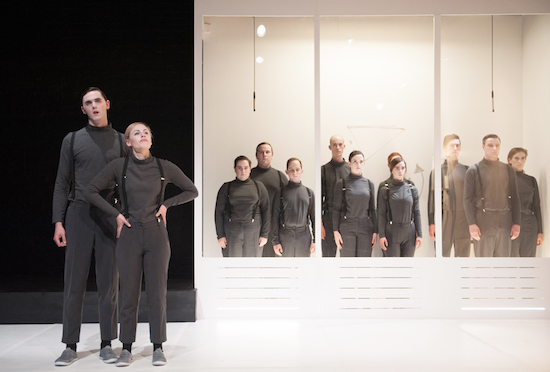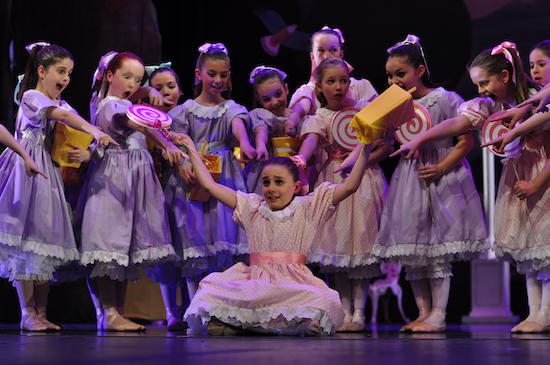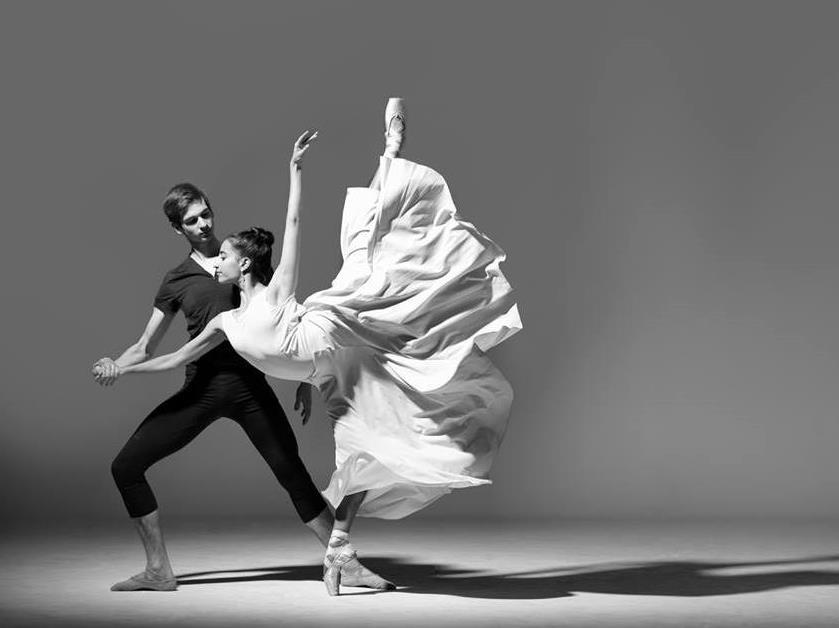Eka Mastrangelo and Matej Perunicic, 2017 graduates of the Ballet School, now dance with West Australian Ballet.
Established in the 1930s, both the National Theatre Drama School and the National Theatre Ballet School train onsite at the iconic St Kilda theatre, which offers six studios plus a warehouse-style drama space offsite.
The training ground is not only unique, it’s helping students become more successful by giving them sustained experience of working in a real theatre.
‘Over the time I have been the Director, our students get promoted very quickly in companies, and I think that’s because of the many performances they get to do and also because we use a professional stage so learn through experience what it’s going to be like as a dancer,’ Beverly Jane Fry, Director of the Ballet School, told ArtsHub.
‘I think we are one of the few establishments in Australia that has their own proscenium arch theatre, designed for dance, to be able to give that experience to students, and it really is completely different – your sense of balance, the lights coming at you, where you spot the exit sign. All those things I have learnt over a 20-year career, we can teach to students while they are still training, which is just a phenomenal advantage for them.’
David Harford from the Drama School said this on-stage experience was imperative for his students also.
‘We have the drama students working in the space as much as possible – it gives them a chance to experience what it’s like to work in a much larger space and project their voices and use their bodies in a way they wouldn’t normally do in a smaller area.’

The schools are privately funded and, in a huge win for students, retained their courses’ recognition as a strong vocational institution meaning students are eligible for the VET Student Loan offset status – a mighty feat amid massive cuts to programs in the arts sector last year.
CEO Amelia Bartak says this is because both schools offer incredibly effective vocational training. The Advanced Diploma in Acting and Advanced Diploma programs in Dance (Elite Performance) in particular have a proven track record with students obtaining professional roles post graduation.
‘Our staff successfully made the case that many of our ex-students have gone on to have professional careers in acting and ballet – we have students employed with West Australian Ballet, Singapore Dance Company and we have actors with Red Stitch and Bell Shakespeare among many others,’ she said.
‘We proved our vocational our courses really are successful and that’s a really big win.’
Other alumni from the National Theatre schools include Richard Cawthorne, Kat Stewart and Lawrence Mooney.
Harford said both schools dedicate the final year of the course to preparing students for life outside of study.
‘The third year is really all about merging themselves into the industry,’ he said. ‘There’s a lot of networking that happens. They get a professionally-shot showreel which they can take to agents and we also have a showcase that we invite agents to.’
Third Year also includes a core project where students must create, fund, market and present their own performance.
Fry says it’s similar for dance students as each gets a CV, photo shoot and showreel, but also the benefit of their teachers’ networks.
‘Obviously I know many directors of dance and I put them in contact with people who I feel are the right company for this particular student,’ she said.

Children as young as two can study at the Ballet School and age five in the Drama School.
Class sizes for both advanced diplomas are kept deliberately small, and Bartak says this enables the teachers – all of whom are industry professionals – to hone students’ capabilities more effectively than they could in a large group.
‘We’re not talking 30-40 class sizes – we are talking about small intimate class sizes where there is a lot of one-to-one time and that is about the proximity to the educator. That’s what we can provide really well through the National Theatre schools,’ she said.
‘We have found that a year out in the real world makes a big difference when it comes to examining themselves throughout the course,’ he said. ‘It’s very demanding and they really have to look inside a lot. If they have just left school and still living at home with mum and dad, it’s very different to someone who has been out and fended for themselves for a year.’
For ballet, the minimum age is 15 and Fry says she encourages her charges to continue studying for their HSC as well as completing the full time course. She says she looks for not only talented dancers in her auditions, but those who are ready for change.
‘The student that I love to teach is the one with an open mind and is ready to change – they have trust in you that you know what you’re doing and they don’t have parameters for what they can achieve through their own body,’ she said.
In 2016 the National Theatre commenced an annual Season program which invites local and interstate companies to perform works at the Theatre, exposing students to an expanding array of professionals to learn from, on occasion as extras in shows and through Masterclasses, workshops and specialist talks.
‘We work collaboratively with other professional companies and festivals and are looking to create extended vocational opportunities for our students to get practical experience as part of their training through these networks,’ Bartak said.
Actor Trent Baker (Neighbours, Homicide, Red Stitch with MTC and Bell Shakespeare) has just been announced as Head Lecturer in Acting. Bartak said his appointment underwrites the schools’ policy of employing industry professionals.
‘When you are a young person thinking about wanting to train to become a professional actor or dancer, you want someone who has been there and done it, not just someone who is academically trained – you want someone who has extensive experience in the craft of acting or ballet combined with professional experience – that’s the nature of vocational education.’
To set up an audition for either the Advanced Diploma in Acting and Advanced Diploma programs in Dance (Elite Performance), or get a term brochure for other classes, call 03 9534 0224 or email ballet@nationaltheatre.org.au or drama@nationaltheatre.org.au.





